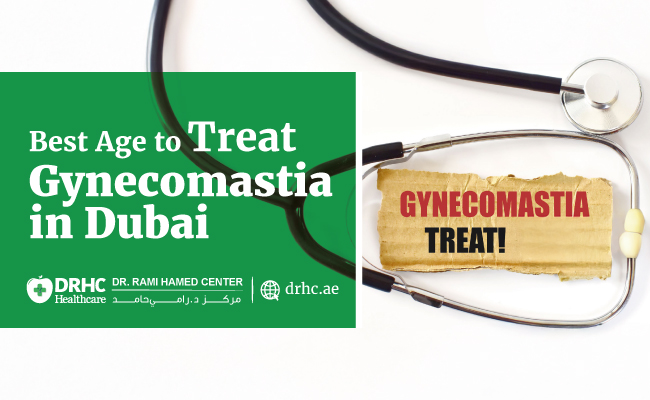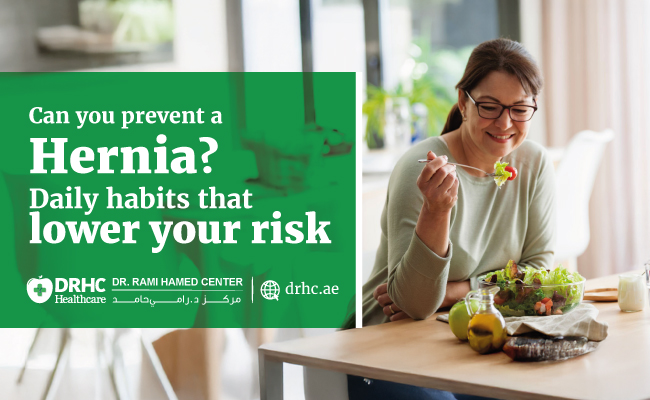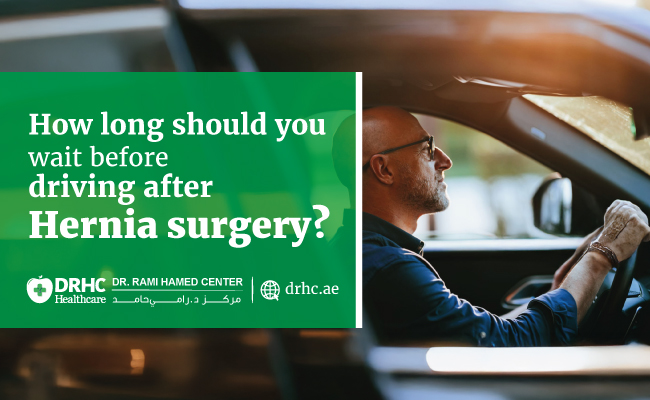
A hernia occurs when an organ or tissue pushes through a weak spot in the abdominal wall. While some hernias cause only mild discomfort, others can turn into a serious medical emergency if left untreated. The most dangerous complications are strangulated hernia and bowel obstruction, both of which require immediate medical care.
At Dr. Rami Hamed Center (DRHC) in Dubai, we often see patients who ignore early signs of a hernia until it becomes severe. Recognizing the warning symptoms early can save you from life-threatening complications and ensure a smoother recovery.
Why Hernias Can Become Dangerous
Not all hernias progress to emergencies, but when they do, they can rapidly compromise blood supply to the intestines or block the digestive tract. Both conditions can cause tissue death, severe infection, or sepsis if untreated. Unlike minor hernia discomfort, these emergencies do not improve on their own and require urgent surgical intervention.
Symptoms of a Strangulated Hernia
A strangulated hernia happens when the herniated tissue becomes trapped, cutting off blood flow. This is one of the most critical conditions requiring emergency surgery.
- Severe, sudden pain that doesn’t improve
- Redness, darkening, or tenderness over the hernia site
- Fever, chills, or rapid heartbeat
- Nausea and persistent vomiting
- Firm, immovable hernia lump
- Swelling around the hernia that worsens quickly
If you notice these symptoms, seek emergency care immediately.
Symptoms of Bowel Obstruction from Hernia
When a hernia blocks part of the intestines, food and waste cannot pass through, leading to a bowel obstruction. This can also be life-threatening.
- Cramping abdominal pain that comes in waves
- Bloating and visible abdominal swelling
- Severe constipation or inability to pass gas
- Repeated vomiting (sometimes with bile or fecal odor)
- Loss of appetite and fatigue
If left untreated, obstruction can progress to strangulation.
Red Flags That Require Immediate Emergency Care
You should go to the emergency room immediately if you experience:
- Sudden worsening of hernia pain
- A bulge that becomes hard, tender, and discolored
- Severe nausea, vomiting, or inability to keep food down
- High fever or chills with hernia pain
- Inability to pass stool or gas for more than a few hours
- Rapid abdominal swelling
What to Do If You Suspect a Hernia Emergency
- Do not try to push the hernia back in yourself — this can cause more damage.
- Avoid eating or drinking until evaluated, as you may require surgery.
- Seek immediate medical care at a specialized hospital like DRHC Dubai, where surgical teams are available.
How DRHC Dubai Can Help
At Dr. Rami Hamed Center, our highly skilled general surgeons specialize in the diagnosis, management, and treatment of complex hernias. We provide:
- Emergency surgical care for strangulated or obstructed hernias
- Minimally invasive (laparoscopic) hernia repair when suitable
- Comprehensive follow-up to ensure safe recovery and prevent recurrence
Our Related Blogs:
- Hernia Repair Success Rates: What Affects Long-Term Outcomes?
- Top Reasons Hernias Recur After Surgery and How to Prevent It
- Non-Surgical Options for Hernia: Do They Really Work?
- Can you live with Hernia without surgery?
FAQs – Hernia Emergency Care at DRHC Dubai
1. Can a hernia wait for surgery, or do I need it immediately?
Not all hernias need urgent surgery, but if you develop severe pain, vomiting, or discoloration of the bulge, you should seek immediate care. Otherwise, your surgeon may plan a repair at a suitable time.
2. What happens if I ignore a hernia?
Ignoring a hernia increases the risk of strangulation or bowel obstruction, which are emergencies and require urgent surgery.
3. Can painkillers help if my hernia gets worse?
Painkillers may mask symptoms temporarily but do not treat the underlying condition. If pain is worsening, it may be a sign of strangulation — and only surgery can fix it.
4. Is emergency hernia surgery riskier than elective surgery?
Yes. Emergency surgery carries higher risks because complications may already be present. Elective surgery, planned in advance, is usually safer and involves faster recovery.
5. How do I know if my child’s hernia is dangerous?
If your child’s hernia becomes painful, hard, or discolored, or if they are vomiting and unable to pass stool, seek urgent pediatric surgical evaluation immediately.
6. Which type of hernia is most dangerous to leave untreated?
Inguinal and femoral hernias are more likely to become strangulated and require prompt surgical attention.
Preventing Hernia Complications
While not all emergencies can be prevented, you can lower your risk by:
- Seeking early medical advice when you notice a bulge or discomfort
- Scheduling planned hernia repair surgery instead of delaying until symptoms worsen
- Avoiding heavy lifting or straining, especially if you already have a hernia
- Maintaining a healthy weight to reduce abdominal wall pressure
- Managing chronic cough or constipation, which can worsen hernia symptoms
Takeaway
A hernia may seem harmless at first, but it can quickly become an emergency if it causes strangulation or bowel obstruction. Recognizing the warning signs and seeking urgent care at Dr. Rami Hamed Center (DRHC) in Dubai can save you from life-threatening complications and ensure the best possible outcome.
📞 Call Us: +97142798200
📍 Visit Us: Dr Rami Hamed Center, Dubai Healthcare City
🌐 Website: www.drhc.ae
Topic: General Surgery hernia surgery




.webp)




Leave a comment